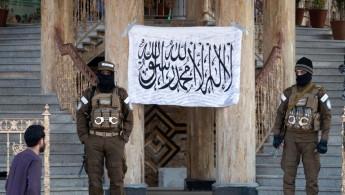Taliban publicly execute man accused of murder, senior officials attend
The Taliban administration on Wednesday put to death a man accused of murder in western Afghanistan, its spokesperson said, in the first officially confirmed public execution since the group took over the country last year.
The execution in western Farah province was of a man accused of stabbing another man to death in 2017, Taliban spokesperson Zabihullah Mujahid said, and was attended by senior officials of the group.
The execution was carried out by the father of the victim, who shot the man three times, Mujahid added in a later statement.
The case was investigated by three courts and authorised by the group's supreme spiritual leader, who is based in southern Kandahar province, said Mujahid.
The fall of Kabul: @S_Jalal_Shajjan takes a look at one year of Taliban rule in Afghanistan https://t.co/6hdqqpxIjx
— The New Arab (@The_NewArab) August 16, 2022
More than a dozen senior Taliban officials attended the execution, Mujahid said, including acting interior minister Sirajuddin Haqqani, and acting deputy Prime Minister Abdul Ghani Baradar, as well as the country's chief justice, acting foreign minister and acting education minister.
It comes after the country's Supreme Court announced public lashings of men and women accused of offences such as robbery and adultery had taken place in several provinces in recent weeks, a possible return to practices common in its hardline rule in the 1990s.
A spokesperson for the U.N. human rights office last month called on the Taliban authorities to immediately halt the use of public floggings in Afghanistan.
The Taliban's supreme spiritual leader met judges in November and said they should carry out punishments consistent with sharia law, according to a court statement.
Public lashings and executions by stoning took place under the previous 1996-2001 rule of the Taliban.
Such punishments later became rare and were condemned by the foreign-backed Afghan governments that followed, though the death penalty remained legal in Afghanistan.
(Reuters)





 Follow the Middle East's top stories in English at The New Arab on Google News
Follow the Middle East's top stories in English at The New Arab on Google News
![Netanyahu furiously denounced the ICC [Getty]](/sites/default/files/styles/image_330x185/public/2024-11/GettyImages-2169352575.jpg?h=199d8c1f&itok=-vRiruf5)
![Both Hamas and the Palestinian Authority welcomed the ICC arrest warrants [Getty]](/sites/default/files/styles/image_330x185/public/2024-11/GettyImages-2178351173.jpg?h=199d8c1f&itok=TV858iVg)
